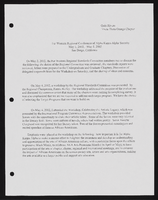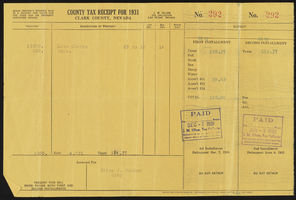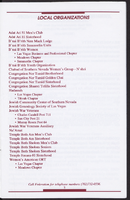Search the Special Collections and Archives Portal
Search Results

Transcript of interview with Jarmilla McMillan-Arnold by Claytee D. White, October 7, 2010
Date
Archival Collection
Description
Jarmilla McMillan-Arnold’s father, Dr. James B. McMillan, was the first black dentist in the state of Nevada. Dr. McMillan’s colleagues consisted of Dr. West, the first black medical doctor in the state, and Dr. Ice, the first black surgeon in Nevada. This interview highlights and archives the solid foundation upon which Nevada’s black community was built. Jarmilla recalls early memories of growing up as the daughter of Las Vegas NAACP president Dr. McMillan. She was born in Detroit, Michigan, to a Caucasian and Indian mother who was a professional dancer. Jarmilla’s parents separated when she was very young and as a result she was raised by her paternal grandmother who owned a restaurant in Pontiac, Michigan. Jarmilla describes her grandmother as being well-known and highly regarded in the community where she maintained her business. Jarmilla attended Catholic schools in Detroit, Pontiac, and Las Vegas. Having moved to Las Vegas with her father, Jarmilla’s narrative offers keen insigh
Text

Transcript of interview with Richard Steele and Zakeisha Steele-Jones by Claytee White, February 12, 2015
Date
Archival Collection
Description
Richard Steele became interested in professional boxing at a young age when he was introduced to world champion boxers Chalky Wright and Sugar Ray Robinson. He trained at Hoover Street Gym in South Central, Los Angeles, with trainer Eddie Futch. Richard joined and boxed for the United States Marine Corps and became Marine Corps Middleweight Champion in 1963. Born in Kansas City, Missouri in 1944 Richard and his family moved to Los Angeles, California in the early 1950s. His father was a bartender and his mother was an elevator operator. During the interview Richard’s daughter Zakeisha Steele-Jones discusses the various job titles her father has held, including professional actor and campus police officer. Most notably, Richard was the second Black professional referee in both Los Angeles, California, and Las Vegas, Nevada. A profound interview heralding key character traits, such as, perseverance, resilience, strength, and determination, Richard recalls being personally invited by Nelson Mandela to referee the WBC Convention in South Africa. Some of Richard’s most memorable title fights to date include, the Hearns and Hagler fight, Sugar Ray Leonard and Tommy Hearns, and four Mike Tyson fights. Zakeisha also interjects that her father currently manages and owns a boxing gym where he trains and mentors young Black and Hispanic aspiring boxing champions and referees.
Text

Dealing with Sexual Exploitation Resource Guide, University of Nevada, Las Vegas, July 1992
Date
Archival Collection
Description
Text

Alpha Kappa Alpha Sorority, Theta Theta Omega Chapter 73rd Far Western Regional conference agenda and report
Date
Archival Collection
Description
From the Alpha Kappa Alpha Sorority, Incorporated, Theta Theta Omega Chapter Records (MS-01014) -- Chapter records file.
Text

Alber A. Mora oral history interview: transcript
Date
Archival Collection
Description
Oral history interview with Alber A. Mora conducted by Rodrigo Vazquez and Laurents Bañuelos-Benitez on December 7, 2018 for the Latinx Voices of Southern Nevada Oral History Project. Alber Mora talks about his life growing up in Cuba with his family and the circumstances of their departure from the country; his brother faced pressures to join the military, which led the Mora family to immigrate to the United States by way of a fishing boat in 1994. Alber discusses the family's lives in Houston, Texas and how he met and married his wife, Rosemary, before the couple moved to Los Angeles and Alber began working at Porto's Bakery, a famous Cuban eatery in L.A. Alber shares how he and his wife eventually moved to Las Vegas, where he works for Caesar's Palace and for the Culinary Workers Union as a Shop Steward.
Text

John Fudenberg oral history interview: transcripts
Date
Archival Collection
Description
Oral history interviews with John Fudenberg conducted by Barbara Tabach and Claytee D. White on May 3, 2018 and May 23, 2018 for the Remembering 1 October Oral History Project. In this interview, John Fudenberg, the coroner for Clark County in Las Vegas, Nevada, gives an account of his experience during the October 1, 2017 mass shooting on the Las Vegas Strip and what his role was during the tumultuous days after the shooting. He explains how he and the staff of the coroner's office prepared for the large number of casualties as well as their arrival at the Route 91 Harvest festival venue. Fudenberg speaks of setting up the Family Assistance Center at the convention center and how it supported the community but also aided the coroner's office in gathering information about the deceased and identifying them. Fudenberg discusses the main job of the Coroner's Office during the first week after the shooting, which was to autopsy the bodies and communicate with the families, as well as the Police Department. He also talks about the emotional impact the shooting and its aftermath had on him and his staff members and the wellness program they implemented, of which trauma yoga and meditation had a large impact.
Text

Stewart family real estate tax records
Date
Archival Collection
Description
Stewart family real estate tax records
Text

Chet Buchanan oral history interview: transcript
Date
Archival Collection
Description
Oral history interview with Chet Buchanan conducted by Barbara Tabach on November 28, 2017 for the Remembering 1 October Oral History Project. Chet Buchanan begins this interview with a discussion of his move to Las Vegas, Nevada in 1999 after he was offered a job as a radio show host for 98.5 KLUC. He talks about the specifics of his job, including his career background as well as the Chet Buchanan Toy Drive. For this interview, he specifically goes into detail on his coverage of the Las Vegas October 2017 mass shooting and discusses being in San Diego, California at the time, yet still striving to reach people through his broadcast with the help of CBS San Diego. Throughout the interview, Buchanan examines his desire to make a difference in the community with his show and his interactions with the public.
Text


